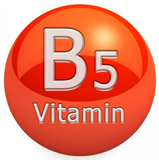VITAMIN B5 - USES, BENEFITS, SOURCES AND DOSAGE

It is water soluble vitamin.
It is also a member of vitamin B family which helps to convert food into energy in the body. Vitamin B5 is found in many natural food sources. Actual meaning of Pantothenic is "from everywhere" because it found in so many food or natural sources.
It is present in all living cells and it plays an important role in metabolism where it acts as part of the molecule called coenzyme A or CoA. Pantothenic acid is found in yeasts, molds, bacteria, and plant and animal cells, as well as in human blood plasma and lymph fluid. It is also found in intestinal wall in the body.
FOOD SOURCES OF VITAMIN B5
It is present in available in wide variety of food sources which are as follows- mushrooms, shiitake mushrooms, fresh meats, kale, corn, broccoli, tomatoes, avocado, legumes, cauliflower, soybean, egg yolk, sweet potatoes, sunflower seeds, whole grain breads and cereals, wheat germ, yeast and salmon.
BENEFITS OF VITAMIN B5
It provides numerous health benefits to the human body. It is found in all living cells as coenzyme-A which plays a vital role in various biochemical reactions in body.
- It is also known as "anti-stress vitamin" because it helps to provide relief from stress and fatigue. It also supports the adrenal gland and maintains the production of corticosterone and other adrenal hormones which are helpful in managing stress and their related disorders.
- It is also helpful in allergies, headaches, arthritis, insomnia, asthma and infections by supporting adequate production of adrenocoticosteroids.
- It also helps in metabolism of carbohydrates, proteins and fats. It supports the synthesis of acetylcholine which is important neurotransmitter that connects the body and mind which is helpful in various neuromuscular activities.
- There are different other neuron disorders such as neuritis, epilepsy and multiple sclerosis and various levels of mental illness and alcoholism which can be managed with the help of vitamin B5.
- It helps to maintain healthy nervous system, eyes, skin, hair and liver, digestive system.
- Other functions include red blood cell formation, production of adrenal and sex hormones, helps in synthesis of cholesterol and other vitamins like vitamin B2 (riboflavin).
DEFICIENCY OF VITAMIN B5
Deficiency of vitamin B5 is very rare. It is found in people who suffers from severe malnutrition.
The common signs and symptoms of vitamin B5 are given below:
- Fatigue
- Weakness
- Reduced immunity
- Vomiting
- Insomnia
- Abdominal and muscular cramps
- Skin problems
- Numbness and tingling in feet
- Burning and shooting pain in feet
- Tachycardia
- Worsening of allergy symptoms.
SIDE EFFECTS
As such there are no side effects of vitamin B5 because it is water soluble vitamin, excess of vitamin gets filtered out. In rare cases of higher dose it may results in diarrhea.
DOSE
The dose recommend on the basis of age and gender which is given below:
For infants:-
- Age 0-6 months: 1.7 milligrams per day
- Age 7-12 months 1.8 mg/day
For children:-
- Age 1-3 years: 2 mg/day
- Age 4-8 years: 3 mg/day
- Age 9-13 years: 4 mg/day
For Adults:-
- Age 14 and older: 5 mg/day (Males)
Pregnant and lactating women:-
- 6 mg/day.

